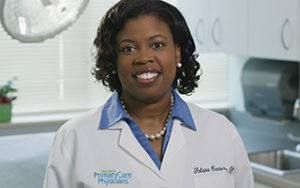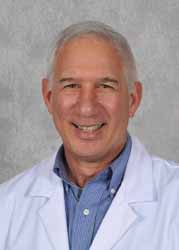Category Archives: Preventative Care
Cholesterol 101
By Victor M. Plavner, M.D.
Have you been told you need your cholesterol checked? Or do you know you already have high cholesterol? What does that really mean and what numbers are important to know when we’re talking about cholesterol?
It’s easy to get confused when you hear people talk about good cholesterol vs. bad cholesterol, and what effect diet vs. heredity plays ─ even what numbers you should be concerned with when you have your cholesterol checked. Each individual should talk with his or her primary care doctor about their blood cholesterol levels and risks, but here is some good general information:
- Cholesterol is a naturally-occurring, waxy substance that’s made naturally in the liver and can be found throughout the body. Cholesterol is also found in some foods we eat. While we need cholesterol for the cells and organs of our body to work effectively, too much cholesterol in our system increases the risk of heart disease and stroke.
- HDL (High Density Lipoprotein) is known as “good” cholesterol because it helps sweep the bad cholesterol out of your blood. LDL (Low Density Lipoprotein) is considered “bad” because it causes the build-up of cholesterol on the walls of arteries, increasing the chances of cardiovascular disease.
- Your cholesterol can be checked through a simple blood test. In general, the number you want is for your total (HDL & LDL) cholesterol to stay below is 200. Broken down further, your optimal LDL level should be below 130 for the average patient, below 100 for the diabetic patient and around 70 for the patient with coronary heart disease. HDL levels above 60 are considered helpful to reducing heart disease risk. So, a lower total and LDL cholesterol is good, and a higher HDL number is better.
High cholesterol is often hereditary and increases with age. However, there are several risk factors you can control: diet, excess weight, sedentary lifestyle, smoking, and diabetes. Some researchers believe that dietary changes alone can lower LDL (bad) cholesterol by as much as 20-30%.
So, don’t panic if you have high cholesterol. Work with your doctor to come up with a dietary and exercise plan and, if needed, there are several medications that can help. And start early to keep your children active and eating healthy so they’ll have to worry less about high cholesterol later.
Dr. Plavner is an MPCP partner and is certified by the American Board of Family Medicine. He received his medical degree from the University of Louvain in Brussels, Belgium, and the George Washington University Medical Center. He completed his residency program in Family Practice at Franklin Square Hospital Center.
Type 2 Diabetes and the Path to Wellness
Hi, I’m Doctor Zarzuela. I’m one of the doctors here at Maryland Primary Care Physicians.
We’ve all seen the negative consequences that our American lifestyle and diet can have.Poor eating habits, inactivity, and stress – it all takes a toll and can lead to diabetes.
If you’ve been diagnosed with type 2 diabetes, it’s time to take steps to manage the disease.
Let’s start with the most important thing to know – and that is your health is in your hands.
You can improve your diet. You can get out and start moving. And you can reduce your stress.
You can join other diabetes patients just like you, who made the changes.
Your primary care doctor can provide the support and the tools to succeed ─ like a glucose monitor to help you stay on track. And you may be referred to a nutritionist, to help you eat better.
As you do the right things to bring your blood sugar back to normal and keep it there, your primary care doctor will be your biggest fan.
It starts with making the changes that can make you healthy again. You’ll see for yourself – your health is in your hands.
For more information, or help managing your diabetes, contact Maryland Primary Care Physicians.
Dr. Zarzuela received his medical degree from the University of Maryland School of Medicine and is certified by the American Board of Internal Medicine. He sees patients in MPCP’s Pasadena office.
Hypertension: Making Some Noise About the ‘Silent Killer’
By: Pio Poblete, M.D.
Most people who have hypertension don’t know it.
Hypertension, or high blood pressure, is when the pressure of the blood in your arteries rises to an unhealthy level. Left untreated, hypertension can lead to heart attacks or heart failure, strokes, aneurysms, and damage to your eyes and kidneys.
Even though hypertension is dangerous, most people experience no symptoms. They can be on the edge of a serious health episode and not still have a clue. That’s why hypertension is called “the silent killer.”
Are you at risk?
There are many factors that can put you at risk for hypertension:
- Age. The older you are, the more your risk of high blood pressure grows.
- Race. High blood pressure is widespread among blacks, and health complications from it tend to be more serious.
- Family history. If you have close relatives with hypertension, you are more likely to get it.
- Unhealthy weight. The more you weigh, the more the pressure you put on your artery walls and the higher your blood pressure.
- Being a couch potato. People who are inactive tend to have a higher heart rate, making your heart work harder and putting more pressure on your arteries.
- Using tobacco. Whether you smoke, chew or are just around people who smoke (secondhand smoke), tobacco can cause your arteries to narrow, increasing your blood pressure and straining your heart
- Too much salt (sodium). Before you reach for the salt shaker, too much sodium in your diet causes fluid retention, leading to higher blood pressure.
- Too much booze. Having more than three drinks in one sitting can raise your blood pressure to unhealthy levels, and long-term heavy drinking can cause heart damage.
- Stress. High levels of stress raise your blood pressure. And if you cope with stress by eating more, using tobacco or drinking alcohol, you only make the problem worse..
Your Next Step
Even though hypertension usually has no symptoms, it can be easily detected. Have your blood pressure checked at your next doctor’s appointment.
If you are diagnosed with hypertension, you can work with your doctor to control it. Your doctor may prescribe medicine, but you will also need to make lifestyle changes to keep your blood pressure down to healthy levels:
- Eating a healthier diet with less salt
- Exercising regularly
- Quitting smoking
- Limiting alcohol
- Losing weight and maintaining a healthy weight
People who make lifestyle changes and get their blood pressure under control can often reduce their need for medicine, and sometimes even stop taking it.
If you haven’t had your blood pressure checked in the last year, now’s the time to contact your doctor. Don’t let the silent killer sneak up on you.
Dr. Pio Poblete is an MPCP partner and sees patients in the Columbia office. He received his medical degree from University of Virginia School of Medicine and is certified by the American Board of Internal Medicine.
Heart Disease Q&A: Knowing Your Numbers
With Dr. Falana Carter
Q: What does “knowing my numbers” have to do with heart disease?
A: We all have our numbers, like cholesterol levels, blood pressure, weight, and blood sugar. Those numbers can tell an important story about your risk for heart disease.
Heart disease is any disorder of the heart muscle, valves, rhythm or blood flow to the heart. Today in the U.S., heart disease is the number one cause of death among both men and women. So knowing your numbers is an important part of your health story. It’s also the first step to reducing your risk of heart disease.
Q: Isn’t heart disease something out of our control – you get it or you don’t?
A: There are two types of risk factors: things you can’t control and things you can. The things you can’t control are your genes: they may predispose you for high blood pressure, high cholesterol or diabetes. If you have a family history of these health conditions, you may be at greater risk for heart disease.
However, there are things you can control, including blood pressure, blood sugar, your weight, cholesterol levels, and smoking. Getting them under control reduces your risk of heart disease. In fact, lifestyle changes can reduce your risk up to 60 percent – and that’s without medication!
Q: What changes should I make?
A: There’s a lot you can do. These things will improve your heart health, as well as giving you better health overall:
- Quit smoking. For people who quit, their risk of heart attack falls to the same level as nonsmokers in just two years.
- Improve cholesterol levels. Cholesterol in your blood includes LDL (bad) cholesterol, HDL (good) cholesterol and triglycerides. A healthy diet and exercise are key to managing cholesterol, though some people may also need medicine.
- Get active. Just 30 minutes of exercise four to five times a week can reduce your risk for heart disease by 30 percent. Exercise reduces your blood pressure and blood sugar. It also helps control your weight and lowers your cholesterol levels.
- Control high blood pressure. Exercise and healthy eating, as well as avoiding salt, are keys to controlling blood pressure, but some people may also need medicine.
- Follow a heart-healthy diet. Eat more foods that are low in fat and cholesterol, including fruits, vegetables, whole grains, beans, nuts and legumes. These foods are high in fiber, which is good for healthy cholesterol, and contain many nutrients.
Eat lean meats, poultry and fish (especially salmon or tuna, which are high in omega-3 fatty acids). And – very important – reduce your intake of salt and sugar.
- Get to a healthy weight. Losing extra weight is good for your heart and can help lower high blood pressure and manage diabetes.
- Control diabetes. Many people who have diabetes don’t know it, so get tested and treated.
- Manage stress and anger. Everyone has stress and anger sometimes, but if it happens a lot, it can damage your heart. Managing stress and handling anger in healthy ways makes you and your heart feel better.
See your doctor to learn what your numbers are, and how they impact your heart health. Your physician can also help you make healthy lifestyle changes and manage your risk factors. Knowing your numbers and getting them under control can help the story of your heart be a long and happy one – for you and your family.
 Dr. Carter is an MPCP partner and is certified by the American Board of Family Physicians. She sees patients at the Arundel Mills office.
Dr. Carter is an MPCP partner and is certified by the American Board of Family Physicians. She sees patients at the Arundel Mills office.






